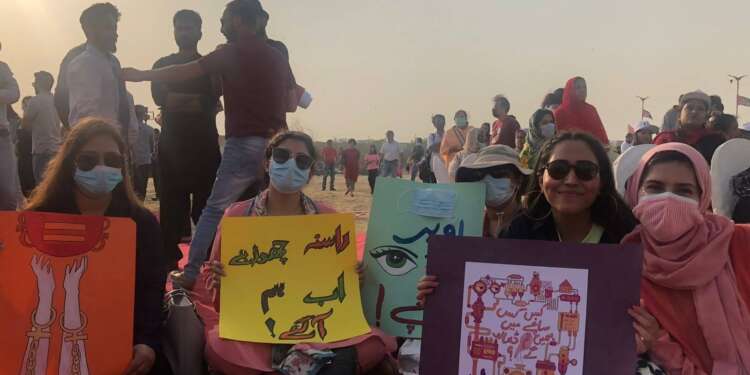The Aurat March, held across Pakistan every year on March 8, has become the most significant and widely recognisable symbol for International Women’s Day in the country.
The event mobilises a large number of women, transgender people and members from marginalised communities, who take to the streets to raise their voices against the patriarchy, systemic oppression and violence. Since its inception in 2018, however, a large segment of the extreme right and opponents with concerted political agendas have turned the Aurat March into a flashpoint for online abuse and violence against its organisers, participants and supporters.
In Pakistan, women not only have to fight for their constitutional right to express themselves on International Women’s Day — a day dedicated to celebrating social, political, economic and cultural achievements of women and highlighting the challenges that impede their growth in these very areas — but they are forced to battle alarming levels of opposition and hostility from extremist, misogynistic and exclusionary voices. Every year, the Aurat March is subjected to intense coverage by both mainstream and digital media aimed at influencing public opinion against the crucial women’s movement; it faces vitriolic attacks, derision and smear campaigns orchestrated to undermine its significance and credibility.
Through structured disinformation and hate campaigns, the movement is labelled a threat to the religion, institution of marriage and family structure when, in fact, it highlights gender-based violence and addresses important issues such as gender parity, education, healthcare, work opportunities and safety for women and the marginalised. Despite the demands being publicly laid out in its manifesto, the movement continues to be attacked with misleading narratives and baseless allegations online.
YouTube, in particular, enables anti-Aurat March elements to drive their agenda through various forms of mis and disinformation. According to a 2022 research by Media Matters for Democracy (MMfD), misleading titles are the most common form of misinformation on YouTube to discredit the Aurat March. The study, Misinformation on YouTube: Use of Misleading Titles to Promote Hateful Narrative against Aurat March in Pakistan, examines the extent to which false information is spread through content on the video-streaming platform against the Aurat March, which has now become central to the discourse on feminism in the country.
The march is actively discredited with coordinated campaigns built around content with sensational and misleading titles and thumbnails, which play a serious role in inciting hatred and hostility against the movement. The creators, claiming to be “journalists”, focus on trivialising the march and amplifying comments that can be tweaked to whip up controversy, instead of highlighting real substantial issues surrounding the rights of women and vulnerable gender minorities. The long-standing allegations that the march is financed by the US are repeatedly brought up every year despite there being no substantial evidence to support such claims.
Leading social media platforms and their inherently discriminatory and flawed infrastructures only exacerbate the situation when online gender-based violence (oGBV) comes into the picture. The convenient weaponisation of online platforms due to their deficient content moderation policies and unwillingness to allocate sufficient regulatory resources for South Asian markets allow a breeding ground for online abuse and harassment. As for movements like the Aurat March, platforms like Twitter, Facebook and YouTube turn a safe hub for detractors and malicious actors to advance their misogynistic, oppressive and exclusionary narratives, compromising the physical and online safety of hundreds of voices involved.
Link to publication: Misinformation on YouTube: Use of Misleading Titles to Promote Hateful Narrative against Aurat March in Pakistan
Note: The Aurat March will be held in Karachi on March 12 this year





